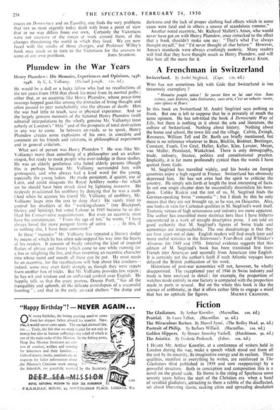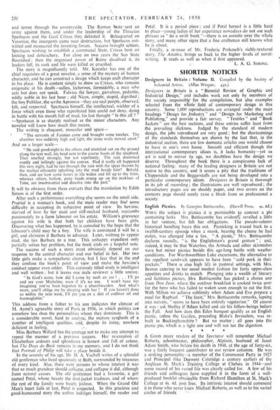I HEARD Mr. Arthur Koestler, at a conference of writers
held in London during the wa,r, make a speech which stood out from all the rest by its sincerity, its imaginative energy and its realism. These qualities, manifest in everything he writes, are reinforced in The Gladiators (first published in 1939 and now reappearing) by a powerful structure. Both in conception and composition this is a novel on the grand scale. Its theme is the rising of Spartacus some seventy years before the start of the Christian era when a band of revolted gladiators, attracting to them a rabble of the disaffected, set about liberating slaves, sacking cities and spreading desolation and terror through the countryside. The Roman State • sent an army against them, and under the leadership of the Thracian Spartacus and the Gaul Crixus they defeated it. Beleaguered on Vesuvius, the insurgents came near destruction, but Spartacus out- witted and massacred the investing forces. Success brought schism, Spartacus wishing to establish a communal State, Crixus bent on looting and debauchery. For close on two years the Sun State flourished ; then the organised power of Rome dis3olved it, its leaders fell, its rank and file were killed or crucified.
The story is magnificently told. Mr. Koestler has one of the chief requisites of a great novelist, a sense of the mystery of human character, and he can construct a design which keeps each character in his place. He is content simply to show us Crixus, who remains enigmatic at his death—sullen, lecherous, formidable, a man who acts but does not speak. Fulvius the lawyer, garrulous, pedantic, oddly noble in his last hour ; old Nicos, simple, stupid, dignified ; the boy Publilor, the scribe Apron ius—they are real people, observed, felt, and respected. Spartacus himself, the intellectual, wielder of a force which even those who reprobated him could not deny, dying in battle with his mouth full of mud, his last thought " Is this all ? " —Spartacus is as sharply realised as the minor characters. Any novelist will know how much this means.
The writing is eloquent, muscular and spare- , "The servants of Fannius came and brought some torches. The chamber was suddenly high and light, the stone walls moved apart." And on a larger scale- " He said good-night to the others and stretched out on the ground along the tent wall, his head next to the coarse boots of the shepherd. They smelled strongly, but not repellently. The rain drummed evenly and lullingly against the canvas. Had it really all happened this very night, had he run through the rain with the spear thrown by the martial silhouette splashing into the mud beside him? Behold, then, and see how some hours in life widen and fill up to the brim, whereas others, hollow, puny beads strung up on the necklace of Time, are insubstantial and dissolve into the past."
It will be obvious from these extracts that the translation by Edith Simon is of the first order.
After such a performance everything else seems on the small side. Prairial is a woman's book, and the male reader may find some difficulty in accepting its subjective point of view. Its heroine, starved of love by her staid and stiff-necked husband, succumbs passionately to a farm labourer on his estate. William's grievance against his wife is that both her children have been girls. Discovering what has happened, he is consoled by the hope that the labourer's child may be a boy. The wife is convinced it will be a girl, and christens it Barbara in advance. Later, wishing to appear mad, she ties Barbara to a tree. This unhappy expedient only partially solves her problem, but the book 'ends on a hopeful note. The success of such a story must obviously depend on our response to the central character and our belief in her. Her two little girls make a sympathetic chorus, but I fear that in the end they confuse the book's point of view and make the heroine's conduct appear even odder. This curiously titled study is intelligent and well written ; but it leaves one male reviewer a little uneasy.
"In God's name, how did I come by such an ass ! . . . I'll go and see your Micheline, even if it's no use. I won't have her imagining you've been begotten by a churchwarden. And what's more, you'll oblige me by sleeping with her ! If you haven't done so within the next week, I'll put you on a diet of codliver oil and haemoglobin."
This address from a father to his son indicates the climate of M. Aymes agreeable story of Paris in 1936, in which politics are somehow less than the personalities whom they dominate. This is a considerable novel, hard to analyse, the mature synthesis of a number of intelligent qualities, and, despite its irony, nowhere deficient in feeling.
Miss Barbara Willard has the courage not to make any attempt to repeat the manner of a previous success. Her re-creation of Elizabethan ardours and splendours is honest and full of colour, but The Dogs do Bark remains in my memory, and I do not think that Portrait of Philip will take a place beside it. In the serenity of his age, Mr. H. A. Vachell writes of a splendid old gentleman who lived spaciously at Bath, surrounded by treasures of every kind. Alas, there were persons to whose interest it was that so much grandeur should collapse, and collapse it did, although from natural causes. The old gentleman had a favourite, a girl named Petal, whose beauty the dust-jacket traduces, and of whom the rest of the family were basely jealous. When the Grand Old Man's heart fails at last, Petal is suspected. In this gracious and good-humoured story the author indulges himself, the reader and Petal. It is a period piece ; and if Petal herseif is a little hard to place—young ladies of her experience nowadays do not use such phrases as "do a swift bunk "—there is an aureole over the whole story, and many other signs that a fine craftsman still knows what he is about.
Finally, a re-issue of Mr. Frederic Prokosch's richly-textured story, The Asiatics, brings us back to the higher levels of novel- writing. It reads as well as when it first appeared.
L. A. G. STRONG.



































 Previous page
Previous page